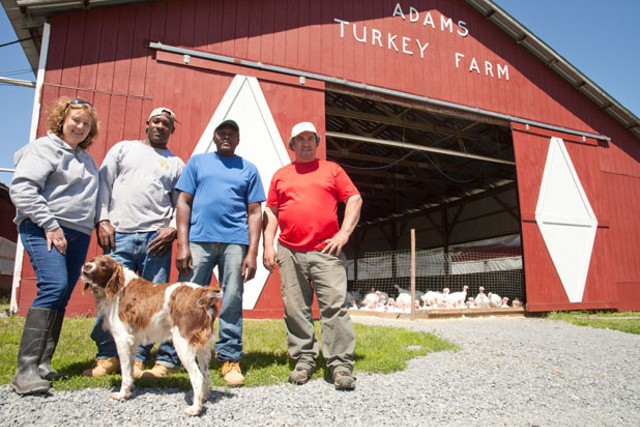Published May 29, 2013 at 11:52 a.m.
When Sen. Patrick Leahy needed someone to explain to Congress why Vermont farms need legal migrant laborers, he didn’t invite a flannel-clad dairy farmer to be his star witness. He called upon Alyson Eastman, a 36-year-old accountant and bookkeeper from Orwell, to testify on the federal immigration overhaul.
Eastman has the distinction of owning the only business in Vermont that brokers H-2A visa applications for farms and orchards that rely on migrant laborers for seasonal agricultural work. She purchased Book-Ends Associates from a relative three years ago, and runs it out of a small, cluttered office a stone’s throw from the 278-acre dairy farm where she grew up. Her business, which employs six other Vermonters, provides accounting and payroll services for local farms, but H-2A work accounts for 40 percent of her revenues.
“She is carrying however many millions of dollars of our produce industry on her back, not to put too fine a point on it,” says Rep. Will Stevens (I-Shoreham), an organic vegetable farmer. “She’s doing yeoman’s work.”
At a U.S. Senate Judiciary Committee hearing on April 22, Eastman testified in favor of expanding the temporary worker program to cover year-round workers, including those on dairy farms. At present, only laborers in Vermont for seasonal work qualify, which is why dairy farms that seek year-round workers often hire migrants who are here illegally. Most of the estimated 1200 Latino farmworkers in Vermont are undocumented.
Eastman’s business handles paperwork to secure H-2A visas for virtually all of the roughly 450 temporary workers who flock to Vermont each year for work. The vast majority comes from Jamaica. Their visas allow them to spend up to 10 months a year working for Vermont orchards, fruit and vegetable farms, and poultry operations.
Eastman helped Dave and Judy Adams find willing migrant workers for their Westford poultry farm. The hours are long and the work is demanding, Judy Adams says, and the couple had trouble finding reliable help at Adams Turkey Farm, which they started in 1984.
“I cannot have our flock of turkeys ready for processing and get calls at 6:30 in the morning that ‘I’m not feeling well today,’ or ‘I’m hungover today,’ or, ‘Such and such can’t give me a ride today,’” says Judy Adams.
Eastman helped the Adams navigate the byzantine process of hiring two Jamaicans, Omar Edwards and Denton O’Connor, on H-2A visas. Knowing the farm was in capable hands, the couple even got away for a quick overnight to Maine this year.
“That was huge for us,” Judy Adams says. “Denton and Omar — I trust them. They can handle whatever comes up as I would handle it … We’re such a team. We just click.”
The H-2A program could disappear entirely with the immigration-reform bill Congress is considering now. As passed by Leahy’s committee, the bill would phase out the existing visa program within one year, replacing it with a new agriculture visa to be overseen by the U.S. Department of Agriculture. Supporters of the change, which would allow workers to stay for up to three years, say it would be less burdensome for employers than the H-2A program.
Eastman favors the new approach because it would allow dairy farmers to hire legal foreign workers for the first time. Her own family sold their dairy herd in 2006, in part because they couldn’t find legal, reliable domestic employees.
It wouldn’t be hard to improve on the H-2A program. Some of the state’s largest orchards used to handle the paperwork in-house. But administering it — which requires immaculate attention to detail, as applications can be rejected over the smallest inconsistencies — has become too much for most employers to handle on their own.
Eastman puts in up to two months of legwork to bring in workers for her clients. She places advertisements in Vermont and out-of-state newspapers — a Department of Labor requirement to prove that the seasonal jobs can’t be filled domestically. She and one of her employees also draft detailed “job order” contracts, outlining specifics such as a worker’s duties, start date and housing.
In addition to the DOL, Eastman is juggling paperwork for immigration officials and the U.S. State Department, working with recruiters, and coordinating with the labor ministry in Jamaica and the embassy in Mexico.
A botched application can result in a worker shortage at a crucial time of year, and crop insurance doesn’t kick in if a farm’s labor force gets held up by H-2A hiccups.
“She dots our ‘I’s and crosses our ‘T’s,” says Judy Adams.
The most recent H-2A headache relates to income taxes. The Internal Revenue Service is asking more of seasonal workers, from requiring them to get Social Security numbers to requiring that their employers file W-2 wage and tax statements for them. While Eastman began filing these additional forms as early as 2008, she says that it wasn’t clear until 2011 — when past-due notices began trickling in — that the IRS had changed its expectations regarding income taxes for the workforce. For decades, H-2A workers were not expected to pay state or federal income taxes.
Some of the unique challenges of working with an itinerant workforce: Not all workers have reliable addresses at home in Jamaica; some are illiterate; and employers often draw additional scrutiny from the IRS when they file workers’ W-2s.
“It’s not easy, and you’d better play by the rules, because you’re going to get audited. Those are the first two things I tell people when they come into the H-2A program,” says Eastman.
Vermont’s Department of Taxes followed in the IRS’s footsteps, and, starting last year, tried to collect back income taxes due between 2008 and 2011. Employers sounded the alarm. Some worried their workers would be denied entry to the U.S. because of unpaid tax bills, while others feared losing laborers to New Hampshire, which doesn’t collect state income tax.
Vermont lawmakers scrambled for a solution, and ultimately tacked a provision onto this year’s agriculture housekeeping bill — H.515 — that forgives state income taxes for H-2A visa holders between 2008 and 2011. Workers are still on the hook for 2012 income taxes, and federal income taxes won’t be forgiven at all.
Stevens estimates those Vermont back taxes would have amounted to a total of less than $100,000; Eastman puts the figure even lower and suggests the state might have spent more to collect those taxes than it would have brought in.
How does Eastman get paid? She charges a flat rate for her service, based in part on the number of workers an employer needs. Her clients range from small operations that need just one or two workers to a larger orchard in New York State that employs more than 200. But it’s worth the price for Vermont farmers. Once the visas are approved, Eastman says workers can be on the farm within 48 hours.
The farmers pay to transport them, which costs an average $1000 per worker. Barney Hodges, who owns the 200-acre Sunrise Orchards in Cornwall, says he’s budgeting $55,000 this year to bring over the 45 Jamaican workers he’ll need to harvest and pack apples. Those workers earn $10.91 per hour.
Although he describes the H-2A as an “extremely cumbersome program,” Hodges admits that his business couldn’t survive without temporary workers. Whatever program ends up replacing it has to meet the orchard’s needs. In planning for its future, Hodges says he’s identified the potential loss of a guest worker program as one of Sunrise’s “primary threats.”
Most of the orchard’s 45 workers come for the apple harvest, from mid-August to early November; eight or so stay through April to pack apples. Hodges’ workforce ranges in age from 22 to 72, and he estimates that some 60 percent have been returning to the orchard for at least 20 years. “A lot of these guys knew me when I was a kid,” says Hodges, who grew up on the family orchard.
Why not hire locally? Hodges says that simply isn’t an option.
“For our region, trying to find 45 workers who are reliable, consistent, have a high quality standard and take a lot of pride in their work to do a very difficult job in a state like Vermont — you’re just not going to find it, period,” says Hodges.
Hodges says Sunrise has never turned down a domestic employee who wants to pick apples, but only gets two or three interested applicants each season.
Those U.S. workers who do take agricultural jobs tend not to last, Eastman adds. “The maximum I’ve seen a U.S. worker stay in those picking positions is two weeks,” she says. One orchard hired eight American workers a few years ago for picking positions. After two weeks, only one was left, and he asked for a transfer from the fields to the packinghouse.
Sunrise Orchards employed 28 domestic workers last year for bookkeeping, marketing, packing, distribution and orchard-management positions. Those jobs wouldn’t exist, Eastman says, without the temporary influx of outside help.
Even if the H-2A visa as it’s known today disappears under immigration reform, Eastman says farmers currently using the program shouldn’t be adversely affected; the reform bill still has provisions for temporary, contracted labor. On the plus side, it could bring some big fixes, such as switching the bulk of oversight from the Department of Labor to the U.S. Department of Agriculture, which Eastman says has a better handle on the requirements and realities of seasonal ag work.
Whatever happens, it’s unlikely that Eastman will face much in the way of competition for her services. Her job requires specialized knowledge — the kind of details that she picked up on the job rather than at Champlain College, where Eastman earned her business degree.
“There’s a lot of red tape with the program,” says Eastman. “You cannot get intimidated by these governmental agencies, and it takes a certain somebody to carry the weight on their shoulders to do this job.”
That said, she enjoys the work — especially when she sees the end result. She’s seen farms grow and prosper with the influx of legal, seasonal help, and she’s inspired by the dedication of workers who return year after year to Vermont.
“These workers are so happy to be here, and it provides a great standard of living for them in their home country,” she says. “They can’t wait to be on the list to be called back next year.”
Eastman’s clients describe her as knowledgeable, confident and easy to understand. A few point out that, because she grew up in a dairy farming family, she has a common-sense understanding of how agricultural enterprises function.
“In a tough program,” says Judy Adams, referring to all the hoop-jumping involved in finding reliable labor for Vermont farms, “she’s been a real bright spot for us.”
More By This Author
About the Artist

Matthew Thorsen
Bio:
Matthew Thorsen was a photographer for Seven Days 1995-2018. Read all about his life and work here.
Matthew Thorsen was a photographer for Seven Days 1995-2018. Read all about his life and work here.
Speaking of...
-

At the Junction of State and Federal Law, I-91 Checkpoint Becomes Site of Legal Collision
Feb 5, 2014 -

Maple Makeover? Vermonters Discover a New Sugaring Technique
Feb 5, 2014 -

Disharmony on Prospect Street: A Dispute Between Neighbors Strikes a Sour Note
Feb 5, 2014 -

Treatment or Trial? Growing 'Rapid-Intervention' Program Gives Addicted Offenders a Choice
Jan 29, 2014 -

Raw Deal? Farmers Push Back Against Unpasteurized Milk Regulations
Jan 29, 2014 - More »
Comments
Comments are closed.
From 2014-2020, Seven Days allowed readers to comment on all stories posted on our website. While we've appreciated the suggestions and insights, right now Seven Days is prioritizing our core mission — producing high-quality, responsible local journalism — over moderating online debates between readers.
To criticize, correct or praise our reporting, please send us a letter to the editor or send us a tip. We’ll check it out and report the results.
Online comments may return when we have better tech tools for managing them. Thanks for reading.




































![Shoreham Orchard Tour [SIV372]](https://media1.sevendaysvt.com/sevendaysvt/imager/shoreham-orchard-tour-siv372/u/square/2456992/episode372.jpg)










